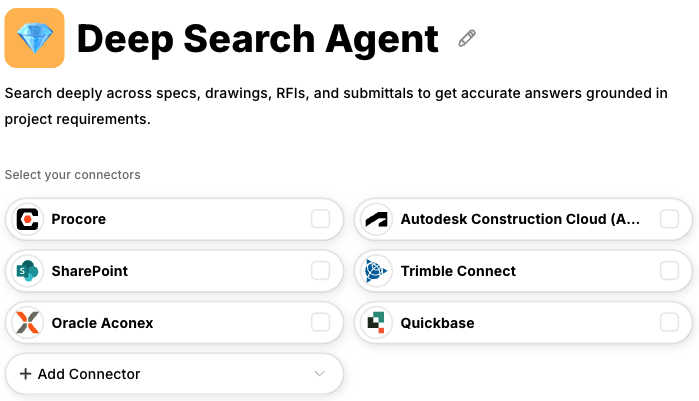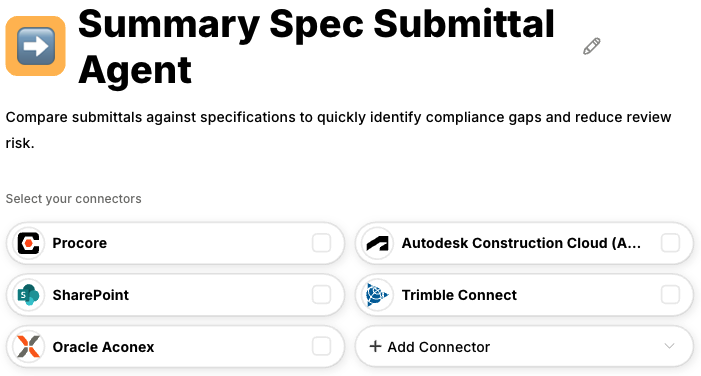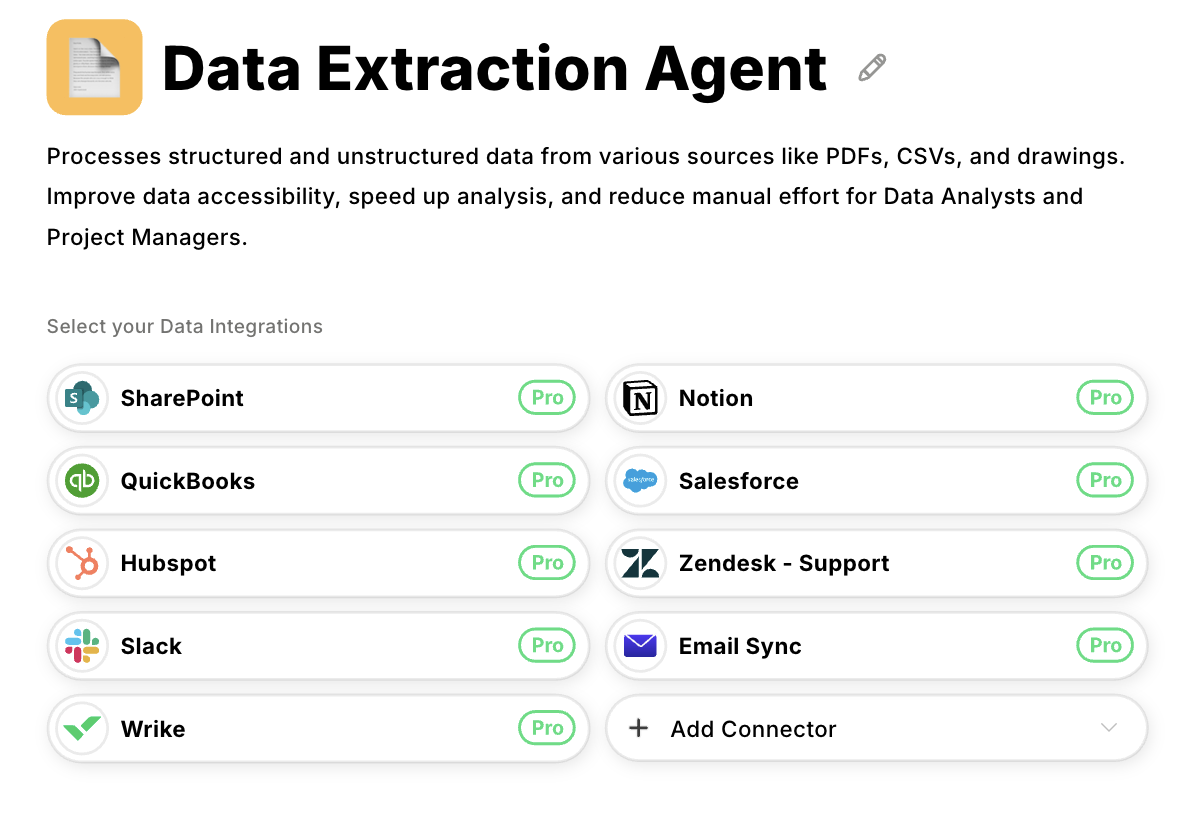This article was last updated on January 27, 2026.
Your estimator just spent four hours hunting down specifications scattered across SharePoint, Procore, and three email threads. Your project executive needs submittal history that exists somewhere in last year's project files. Your operations team answers the same questions repeatedly because institutional knowledge lives in senior staff heads rather than searchable systems.
Information gathering consumes a disproportionate share of operational capacity across construction, insurance, and manufacturing. The data exists, buried in drawings, specs, contracts, loss runs, production logs, and documents across disconnected systems. The challenge lies in the manual labor required to find, cross-reference, and synthesize information every time someone needs an answer.
AI agents change this equation by executing information retrieval tasks autonomously, searching across systems, extracting relevant data, and delivering synthesized answers without requiring you to specify which folder to check.
How AI Agents Execute Information Gathering
Traditional search requires you to know where information lives. AI agents operate differently. They interpret what you need, determine which sources to query, and retrieve relevant context across multiple systems simultaneously.
Information gathering has become a leading enterprise use case for AI agents alongside general productivity tasks and customer service.
The architecture involves specialized agents working in coordination to handle complex, multi-step information requests that traditional automation cannot address.
| Agent Type | Function |
|---|---|
| Query Planning | Decomposes complex requests into executable steps |
| Routing | Determines which data sources contain relevant information |
| Retriever | Extracts context from enterprise systems |
| Validation | Verifies accuracy before delivery |
| Executor | Composes responses or invokes tools to perform actions |
The practical difference shows in real scenarios. Instead of searching five systems manually to answer a question about historical submittal compliance, an AI agent queries all relevant sources in parallel and returns a synthesized response with supporting documentation.
Construction: From 32+ Hours to 1 Hour for Submittal Review
Construction operations generate massive documentation (e.g., RFIs, submittals, drawings, specs, daily reports, change orders) spread across Procore, Autodesk Construction Cloud, Primavera P6, SharePoint, and email. Finding specific information means knowing which system to check, which project folder to navigate, and which version applies.
AI agents like Datagrid's Deep Search Agent automate this retrieval by searching across project documentation simultaneously. When a project manager asks about specification requirements for a particular assembly, the agent queries specs, related RFIs, relevant submittals, and applicable drawing details, returning a consolidated answer rather than a list of documents to review.

Accelerate Submittal Review
Datagrid's Summary Spec Submittal Agent compares submittals against specifications to identify compliance gaps automatically. Jacob Freitas, Project Executive, reported reviewing "8 submittals in 1 hour" compared to "32+ person-hours" required for manual submittal review, representing an 87.5% time reduction.

Automate RFI Processing and Response
RFI responses require gathering information from multiple sources including original specifications, related submittals, previous RFI responses on similar issues, and applicable drawing details. AI agents can assemble this supporting documentation automatically by extracting requirements from RFIs and pulling supporting materials from integrated systems like BIM 360, Procore, and document management platforms.
Agents then route RFIs to appropriate team members within minutes based on content analysis, past responses, and project assignments. When RFI responses conflict with project specifications, agents identify these discrepancies and alert relevant team members before the response is delivered.
Datagrid's RFI Checker and RFI Validator agents check RFIs against project documents and validate necessity before submission.
Insurance: Automating Document-Intensive Workflows with AI Agents
Insurance operations run on documents (e.g., applications, medical records, loss runs, financial statements, policy forms) arriving in varying formats from multiple sources. Underwriters and claims processors spend significant time extracting data from these documents before analysis can begin.
AI agents can automate information extraction through coordinated AI workflows, with specialized agents handling query planning, routing, data retrieval, execution, and validation.
Submission Processing
When submissions arrive, Data Extraction and Validator Agents process applications across varying formats (e.g., ACORD forms, custom templates, supporting documentation, medical records, loss runs), automatically extracting required data, identifying incomplete packages, and verifying cross-form consistency.

Rather than underwriters manually reviewing each document for missing information, agents surface gaps before the file reaches the underwriting queue, enabling exception-based routing where routine items flow through automation while flagged items proceed to human teams.
Claims Document Gathering
Claims processing requires collecting and organizing documentation from multiple sources including insurance applications, medical records, loss runs, financial statements, and prior claim history. AI agents gather and cross-reference this information, building standardized case files that comply with ACORD standards while flagging items requiring expert review.
Datagrid's insurance automation capabilities integrate with ACORD's comprehensive standards for claims processing, policy administration, and workflow standardization. The platform maintains compliance documentation for regulatory requirements including NAIC AI principles through clear accountability for AI-driven decisions and human-in-the-loop processes for high-risk determinations.
Compliance Documentation
AI agents maintain comprehensive audit trails of document processing decisions and provide clear accountability for AI-driven operations, addressing the NAIC AI principles' requirements for documentation and regulatory examinations.
Manufacturing: Information Synthesis Across Production Systems
Manufacturing operations generate data continuously (e.g., production metrics, quality measurements, equipment sensor readings, supply chain documentation) across ERP systems, Manufacturing Execution Systems, and quality management platforms. Synthesizing this information for operational decisions traditionally requires manual data pulls from multiple systems.
AI agents integrate across these platforms to deliver consolidated operational intelligence. When a production manager needs to understand why a line is underperforming, the agent gathers relevant data from production logs, quality records, maintenance history, and material specifications, surfacing potential root causes rather than raw data exports.
Synchronize Production Documentation and Quality Records
Work instructions, specifications, and equipment documentation often exist in disconnected systems. When resource allocations change, AI agents automatically identify which work instructions need updates by matching equipment capabilities to production requirements in real time.
By cross-referencing specifications, scheduling data, and operator information stored in enterprise systems like Primavera P6, SAP S/4HANA, and MES platforms, these agents ensure documentation stays synchronized with current production capabilities.
Vision systems and analytics monitoring product quality in real-time can be combined with process parameters and supply chain variables to detect patterns and anomalies, allowing manufacturing teams to correlate quality metrics with production conditions more efficiently than manual processes.
Datagrid's manufacturing capabilities include integration with SAP S/4HANA, Primavera P6, MES platforms, and cloud storage systems, enabling agents to access equipment specifications, scheduling data, and operator information from a unified interface.
Steps to Deploy AI Agents for Information Gathering
Deploying AI agents for information gathering follows a phased deployment approach. Start with high-volume standardized documents to prove value quickly, then expand to more complex document types.
Step 1: Map Current Information Requests
Document where your team spends time hunting for information. Which questions get asked repeatedly? Which requests require searching multiple systems? Which information gathering tasks create bottlenecks during peak periods?
Step 2: Identify System Integration Requirements
Effective AI agents require access to the systems where your information lives. Evaluate which platforms need connection (e.g., document management, project management, ERP, CRM) and verify integration capabilities before selecting a platform. Datagrid provides 100+ system integrations including Autodesk BIM 360/ACC, Procore, Salesforce, SAP S/4HANA, and common cloud storage platforms.
Step 3: Start with Standardized Document Types
Begin with high-volume standardized documents where extraction rules are clear. Specification searches, submittal compliance checks, and policy document processing offer predictable patterns that AI agents handle reliably.
Step 4: Establish Exception Routing
Configure intelligent routing to separate routine tasks from complex or high-risk decisions. Exception-based routing ensures that AI agents handle routine extraction and validation while flagging items requiring human expertise. Define routing rules based on confidence thresholds, data completeness, and regulatory sensitivity to ensure appropriate human-in-the-loop workflows.
Step 5: Measure and Expand
Track time savings on initial use cases to build the business case for expansion. Document which information gathering tasks remain manual and prioritize based on frequency and time impact.
Scale Information Gathering with AI Agents Without Adding Headcount
Organizations have achieved substantial efficiency gains through agent-centric workflow redesign. A global industrial firm, for example, dramatically reduced audit reporting time by 92% through this approach. The strategic value extends further than individual task efficiency.
When information gathering becomes automated, your senior staff stop being the bottleneck for institutional knowledge. The project executive's understanding of owner preferences, the underwriter's knowledge of risk patterns, and the production manager's insight into equipment quirks all become accessible through AI agents rather than dependent on asking the right person.
Automating information gathering effectively removes the friction that slows every decision requiring cross-system information synthesis.
Automate Information Gathering with Datagrid
Datagrid's AI agents transform how teams across construction, insurance, and manufacturing access and synthesize information from disconnected systems:
- Cross-System Search: Datagrid's Deep Search Agent queries multiple platforms simultaneously, returning consolidated answers instead of document lists to review.
- Document Compliance Automation: The Summary Spec Submittal Agent compares submittals against specifications automatically, reducing review time from 32+ hours to under 1 hour.
- 100+ Enterprise Integrations: Connect to Procore, Autodesk BIM 360/ACC, SAP S/4HANA, Primavera P6, and common cloud storage platforms to access information wherever it lives.
- Exception-Based Routing: AI agents handle routine extraction and validation while flagging complex items for human expertise, ensuring appropriate oversight without bottlenecks.
- Audit Trail Compliance: Maintain comprehensive documentation of AI-driven decisions to meet regulatory requirements including NAIC AI principles and ACORD standards.
Create your free Datagrid account to start automating information gathering across your enterprise systems.













